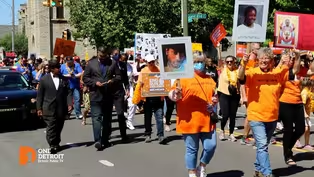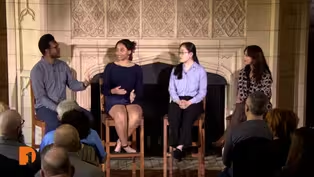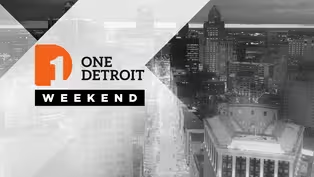
Reflecting on Detroit’s 1963 Walk to Freedom 60 years later
Clip: Season 7 Episode 54 | 6m 20sVideo has Closed Captions
Rev. Dr. JoAnn Watson reflects on the Detroit Walk to Freedom for its 60th anniversary.
Rev. Dr. JoAnn Watson, senior pastor of West Side Unity Church in Detroit, reflects on attending the 1963 Detroit Walk to Freedom as a child with her grandparents ahead of the Detroit NAACP’s June Jubilee events, which includes the 60th anniversary commemoration of the march. And we get a look at the awardees and keynote speaker for the NAACP’s 68th annual Fight for Freedom Fund dinner.
Problems playing video? | Closed Captioning Feedback
Problems playing video? | Closed Captioning Feedback
One Detroit is a local public television program presented by Detroit PBS

Reflecting on Detroit’s 1963 Walk to Freedom 60 years later
Clip: Season 7 Episode 54 | 6m 20sVideo has Closed Captions
Rev. Dr. JoAnn Watson, senior pastor of West Side Unity Church in Detroit, reflects on attending the 1963 Detroit Walk to Freedom as a child with her grandparents ahead of the Detroit NAACP’s June Jubilee events, which includes the 60th anniversary commemoration of the march. And we get a look at the awardees and keynote speaker for the NAACP’s 68th annual Fight for Freedom Fund dinner.
Problems playing video? | Closed Captioning Feedback
How to Watch One Detroit
One Detroit is available to stream on pbs.org and the free PBS App, available on iPhone, Apple TV, Android TV, Android smartphones, Amazon Fire TV, Amazon Fire Tablet, Roku, Samsung Smart TV, and Vizio.
Providing Support for PBS.org
Learn Moreabout PBS online sponsorship(soft bright music) - I am here with Reverend Joann Watson, and we are talking about the 60th anniversary of the Detroit Walk to Freedom that occurred in 1963, and you were there for that event.
What was your experience on that day?
- It was a magnificent day.
I was 12 years old, and my grandparents unexpectedly picked me up.
I had no idea where I was headed, and we were headed to Cobo to hear Reverend Dr. Martin Luther King Jr and to see the largest crowd I had ever seen in my life.
It was just truly a triumphant event 'cause you felt lifted up by the crowd, you felt energized by the excitement, and my grandmother held my hand tightly as we surged through that huge crowd.
For some reason, I never felt tired.
We were there a long time, but I felt lifted up.
- So the March or the Walk to Freedom was to generate awareness and raise funds for the Southern Christian Leadership Council.
- Well, the signs all said jobs, justice, peace.
Jobs, justice, peace which I later learned was the mantra for Dr. King's events.
But that march really changed my life, and it still touches me today to think about Dr. King's voice, how it reverberated with those loud speakers, how the crowd hung on every word.
Nobody left without talking about Dr. King's speech.
It was mesmerizing.
- Now this was the first time that he gave the I had a dream speech.
- Right.
- Before Washington.
- That's true.
- Which people forget.
What did the walk to freedom mean to the people in Detroit at that time?
- It meant a lot because the injustice that was happening around the country was not just in the south.
It also included the north.
There were housing issues, employment issues, we had police brutality in Detroit that was unaddressed, and I remember walking to choir rehearsal as the eldest of 10.
The girls never got stopped, but the boys in my family would get stopped frequently by police for nothing.
Nothing.
And so we witnessed injustice, and there was a need to have a march in Detroit.
We felt that Detroit was part of the movement.
So not only organized labor, but block clubs, community groups, youth groups.
We felt a part of it.
We felt a part of what was happening.
- You've had a career in public service serving for the YWCA as the executive director for the Detroit branch, the assistant executive director for the national YWCA.
Served on city council.
The community liaison for Congressman John Conyers.
At 12 years old, did you know this was going to be your path?
- Had no idea.
Didn't know what I was going to be doing.
I just knew that I was going to try to make a difference in my life.
Reverend Dr. CT Vivian was a mentor of mine, and he was one that Dr. King called the greatest preacher who ever lived.
I was certainly mentored by Dr. Dorothy Irene Height, who I loved and respected.
She was actually the highest ranking black woman in the YWCA of the USA, but she saw all of us as her mentees.
We were all her children.
I was mentored by Mother Rosa Parks who I loved and respected.
She lived in Detroit more years than she lived in Montgomery, Alabama, and we both worked for Congressman John Conyers.
She would go to reparations conferences with me.
So I'm very blessed, very blessed.
I didn't ask for it, could not have hoped for it, but it came into my life.
- But you continue to share that legacy and you continue to pass it on to the next generations and to the community, and to impact change.
Can you talk about some of the ways that you have made those changes, and the people that you have helped to nurture and mentor and guide?
- There's a wonderful organization in Detroit called We the People of Detroit, and they have gone door to door making sure people have access to water in Detroit and Flint.
They have been galvanizing and organizing around the country, and of course in Detroit, to make sure that people keep their water on, have access to water.
So I've made the water as a human right an important part of my legacy, and made sure that there's somebody following me who will carry that on in a generational way.
- Something people may not know about you, as you spoke of youth, is that you were on the board of American Girl.
- I was.
- The doll company, and you had an impact on one of the dolls that was created, Melody.
- I did.
- Tell us a little bit about Melody and the inspiration for Melody.
- They were looking for someone who could help them understand what life was like for a girl in the '60s who was embracing the Motown music sound, which I did.
Mattel folks and the American girl people when they came to Detroit, and I drove them all around the city to show them all the things that made Detroit so unique and special, and also to talk about how Detroit was proudly a part of that '63 march.
- What can people do today to celebrate the 60th anniversary of the Detroit Walk to Freedom?
- I think they should identify acts that will help change.
We're not just here to take care of ourselves.
What have you done to help somebody today?
If I can help somebody along the way, then my living has not been in vain.
16th annual Silence the Violence march against gun violence
Video has Closed Captions
Clip: S7 Ep54 | 6m 18s | The Church of the Messiah’s 16th annual Silence the Violence march against gun violence. (6m 18s)
Gen Z panel discusses the future of work, higher education
Video has Closed Captions
Clip: S7 Ep54 | 5m 55s | Three Gen Z students share thoughts on the future of work and placemaking in Michigan. (5m 55s)
One Detroit Weekend: June 16, 2023
Video has Closed Captions
Clip: S7 Ep54 | 1m 55s | Check out Father’s Day events, Juneteenth celebrations and more on “One Detroit Weekend.” (1m 55s)
Providing Support for PBS.org
Learn Moreabout PBS online sponsorship
- News and Public Affairs

Top journalists deliver compelling original analysis of the hour's headlines.

- News and Public Affairs

FRONTLINE is investigative journalism that questions, explains and changes our world.












Support for PBS provided by:
One Detroit is a local public television program presented by Detroit PBS


